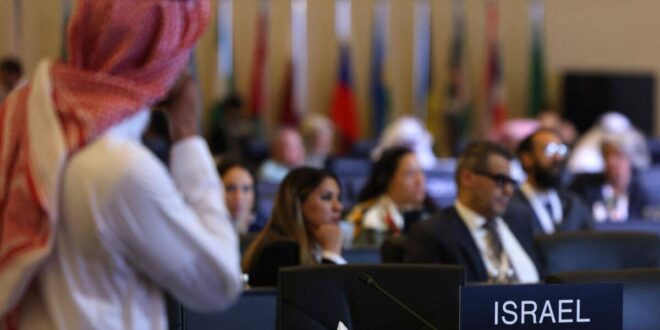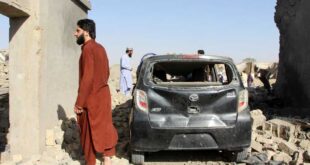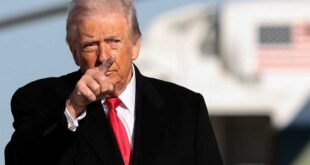Israel hopes the corridor announced at the G20 will facilitate normalized relations with Saudi Arabia. Riyadh doesn’t see it that way.
At the G20 summit President Joe Biden announced that India, Saudi Arabia and the United Arab Emirates (UAE), together with Israel, France, Germany, Italy and the US, want to create an ‘India– Middle East–Europe Corridor’ (IMEC).
This rail and shipping route would include advanced fibre optics, clean hydrogen pipelines and economic zones stretching from India, through the UAE, Saudi Arabia, Jordan and Israel, to Piraeus Port in Greece.
A working group will lay out timetables, financing plans and projects in the next two months. If it materializes, the grandiose project could create a new dimension of economic integration between the Middle East, South Asia and Europe.
Some in Israel are tempted to see the initiative as a way to fire-up normalization with Saudi Arabia – a diplomatic effort integral to US strategy in the Middle East.
The obstacles to an economically feasible project are significant, and Riyadh has other motives for participation.
Israel’s National Security Adviser, Tzachi Hanegbi, called the corridor ‘the most meaningful evidence’ that both sides are moving from ‘a shot in the dark’ towards meaningful efforts to normalize relations between the two countries.
But the obstacles to an economically feasible project are significant, and Riyadh has other motives for participation.
A means to an end for Washington
For the US, the project to normalize relations between Israel and Saudi Arabia is a means to an end.
The Biden administration has been pushing for a deal as part of a broader plan to contain Iran and check China’s expanding influence in the Middle East (A Beijing-brokered deal to restore Saudi–Iran diplomatic ties, announced in March, was a wake-up call for Washington).
The US plan aims to reshape the Middle East’s geoeconomic landscape through connectivity projects like IMEC
The US plan aims to reshape the Middle East’s geoeconomic landscape through connectivity projects like IMEC, helping to alleviate Gulf countries’ doubts about its commitment, reduce tensions with Iran and bolster its leadership in the Gulf.
The corridor would complement other coalitions of friendly powers such as the India–UAE–Israel–US I2U2 and the G7-led Partnership for Global Infrastructure and Investment (PGI) – seen as a rival China’s Belt and Road Initiative (BRI).
And the US believes its strategic objectives will not be realized without pushing forward Israel’s Abraham Accords normalization agenda, especially with Saudi Arabia.
Israel–Saudi relations are key
This explains the pressure the US is allegedly placing on Riyadh to trim down its deepening ties with China and normalize relations with Israel – in exchange for a security pact and support developing its own civilian nuclear program.
Despite its reluctance to officially join, the new IMEC already makes the Saudis de facto signatories to the I2U2 with Israel.
As time passes, it’s hoped, the corridor will therefore create the economic and psychological conditions to facilitate normalization.
For India, Israel’s 2020 Abraham Accords with the UAE boosted its relations with the US and the Middle East and galvanised its vision for more multilateralism and multipolarity.
However, to India the IMEC is about searching for alternative trade routes to the North-South Transport Corridor to Russia via Iran, and thwarting ‘encirclement’ by the BRI.
The view from Riyadh
For those sitting in Riyadh or Abu Dhabi however, things look different. The corridor fits into a broader Saudi plan for economic diversification and an effort to create a more independent foreign policy.
It is viewed neither as part of strategic competition with Iran nor as part of an effort to establish relations with Israel. Unlike in the US, Gulf States never saw the latter as a prerequisite for, or even linked to, the former.
Regardless, normalization has another set of challenges to overcome, ranging from the US Congress’ staunch opposition to a civilian nuclear program for Saudi Arabia to an ultra-far-right Israeli government.
Saudi Crown Prince Mohamed Bin Salman might also be tempted to kick negotiations beyond the 2024 US presidential elections.
Saudi Crown Prince Mohamed Bin Salman might also be tempted to kick negotiations beyond the 2024 US presidential elections to potentially clinch a better deal from a Republican president.
Jordan, a central node in the new corridor, has kept silent to avoid an internal backlash to doing business with Israel, which further complicates the corridor’s prospects.
Economic feasibility
The project’s feasibility may also not match the political hype.
According to some estimates, goods could reach Europe from Mumbai using the new route 40 per cent faster than the Suez Canal and cut the cost by 30 per cent.
This sounds hyperbolic, given the loading and unloading costs involved and time in each port along the way, as well as the future transit tolls and fees.
Insufficient infrastructure is another hurdle. While some parts of the railway network connecting the gulf are still incomplete, Jordan’s entire antique railway system needs a makeover.
The main sponsors are yet to be revealed – a crucial element as the corridor is touted as a component of the PGI, which (unlike the BRI) relies on private-sector investments.
Financing is also a thorny issue. The main sponsors are yet to be revealed – a crucial element as the corridor is touted as a component of the PGI, which (unlike the BRI) relies on private-sector investments.
Private investors may find the cost and longevity of the project prohibitive.
 Geostrategic Media Political Commentary, Analysis, Security, Defense
Geostrategic Media Political Commentary, Analysis, Security, Defense





